Within sight of border, war-weary Syrians dream of Turkey
Turkey hosts the most Syrian refugees in the world at 3.6 million
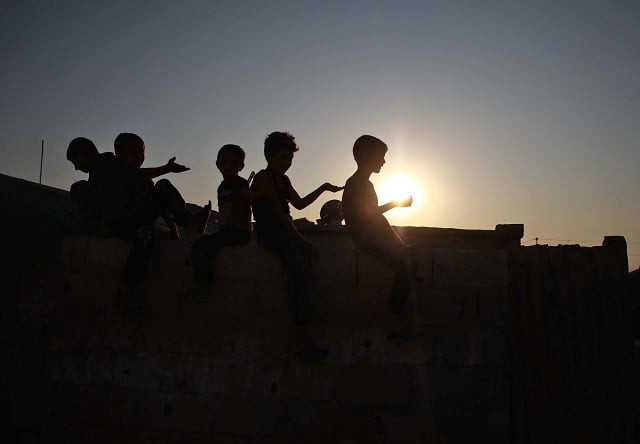
Displaced Syrian children pose for a picture at a camp for displaced Syrians in Atme in the northwestern Idlib province, near the border with Turkey. (Photo: AFP)
They have tried five times to smuggle themselves and their two children across the border in recent weeks.
But all their attempts have failed, forcing them back each time to a temporary shelter in Syria's war-torn northwestern region of Idlib.
"There is no work for me here, the situation is disastrous," 31-year-old Jaber said.
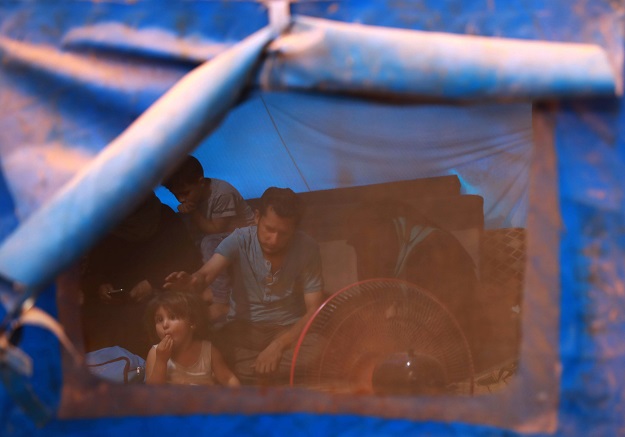 Jaber Karawan pats his daughter's head as he sits with his wife Walaa and others inside a shelter at a camp for displaced Syrians in Atme in the northwestern Idlib province, near the border with Turkey. (Photo: AFP)
Jaber Karawan pats his daughter's head as he sits with his wife Walaa and others inside a shelter at a camp for displaced Syrians in Atme in the northwestern Idlib province, near the border with Turkey. (Photo: AFP)Dreaming of proper treatment for their three-year-old daughter who suffers from an eye condition, Jaber and his wife Walaa have borrowed money from relatives and drained their savings to pay smugglers $1,200.
But on their fifth attempt this week, Jaber tumbled from the grey concrete wall separating the two countries, breaking his leg.
Will a 'safe zone' be set up in northern Syria?
Just hours earlier, wearing a crisp white shirt, his face neatly shaven, Jaber had helped his wife and two children straddle a motorbike outside their camp in the town of Atme.
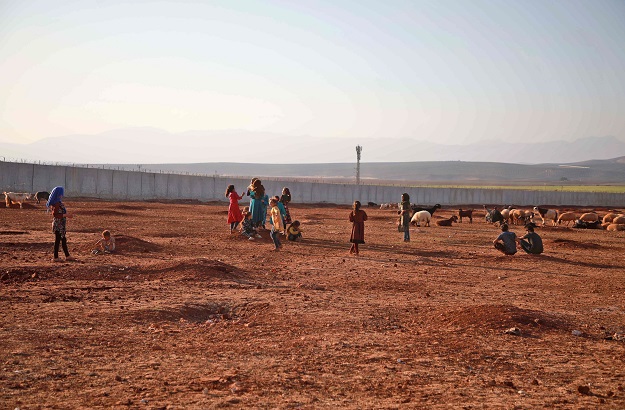 Children play in an open field near of the barbed-wire-topped concrete fence demarcating the border between Syria and Turkey, at a camp for displaced Syrians in Atme. (Photo: AFP)
Children play in an open field near of the barbed-wire-topped concrete fence demarcating the border between Syria and Turkey, at a camp for displaced Syrians in Atme. (Photo: AFP)With two small bags in tow, the family of four aimed to cross the nearby Turkish border illegally.
When an AFP correspondent first met Jaber, it was after a previous such attempt.
He was helping his children disembark from a taxi that drove them back from the Turkish frontier, where they were briefly detained by border guards.
 Jaber Karawan and his wife Walaa sit with their children and others inside a shelter at a camp for displaced Syrians. (Photo: AFP)
Jaber Karawan and his wife Walaa sit with their children and others inside a shelter at a camp for displaced Syrians. (Photo: AFP)The family has landed in Turkish custody several times after trying to cross.
Each time, they trek for hours through rocky terrain under the cover of night, before trying to scale the border wall, where they are intercepted by Turkish patrols.
"This is not a life," Jaber told AFP, sitting inside his tent in a camp for the displaced before the fifth attempt.
"I'll try 50, 60, 100 times until I get in," he said.
Turkey, Russia, Iran must take more responsibility for Syria peace: Erdogan
Originally from southern Idlib, Jaber and his family are among more than 400,000 people driven from their homes by months of fierce bombardment.
"I want to go there to find a job, to provide for my children and to look after my daughter," Jaber said, as nearby his three-year-old girl ate crisps scattered on a thin mattress.
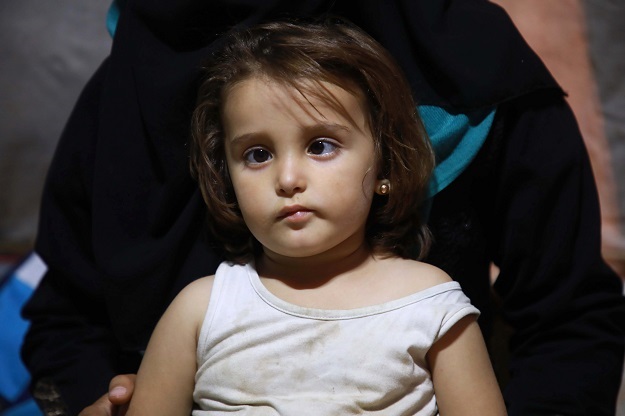 Mirale, the daughter of Syrian Jaber Karawan and his wife Walaa, who suffers from an eye disease, sits in the lap of her mother. (Photo: AFP)
Mirale, the daughter of Syrian Jaber Karawan and his wife Walaa, who suffers from an eye disease, sits in the lap of her mother. (Photo: AFP)Airstrikes by Damascus and regime ally Moscow have killed nearly 1,000 civilians since late April, according to the Britain-based Syrian Observatory for Human Rights.
But since August 31, a Russian-backed ceasefire has largely held, despite sporadic strikes.
"We risk our lives to go to Turkey, and in the end, we cannot," Walaa said, her expression hidden by a full-face veil.
Turkey hosts the most Syrian refugees in the world at 3.6 million.
But it now seems determined to send some of these refugees back home.
Turkey says ready to implement Syria safe zone plan with US 'without delay'
In recent weeks, human rights groups have decried reports of hundreds of refugees being deported back to Syria as part of a crackdown on those without the right residency papers.
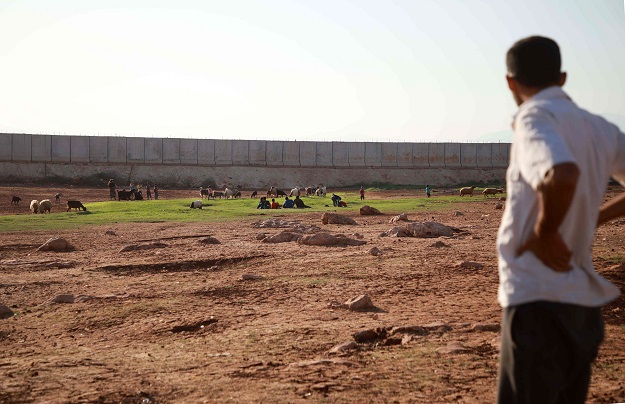 A displaced Syrian man looks towards the barbed-wire-topped concrete fence demarcating the border between Syria and Turkey (Photo: AFP)
A displaced Syrian man looks towards the barbed-wire-topped concrete fence demarcating the border between Syria and Turkey (Photo: AFP)Ankara, however, says all returns are voluntary.
President Recep Tayyip Erdogan has stated that eventually two to three million Syrian refugees in Turkey or Europe could be resettled in Syria if a so-called "safe zone" is created along the Syrian side of the border.
Also displaced by violence in Idlib, Abu Salloum, his two wives and eight children now live in a rough, cinderblock home, only metres from the border wall.
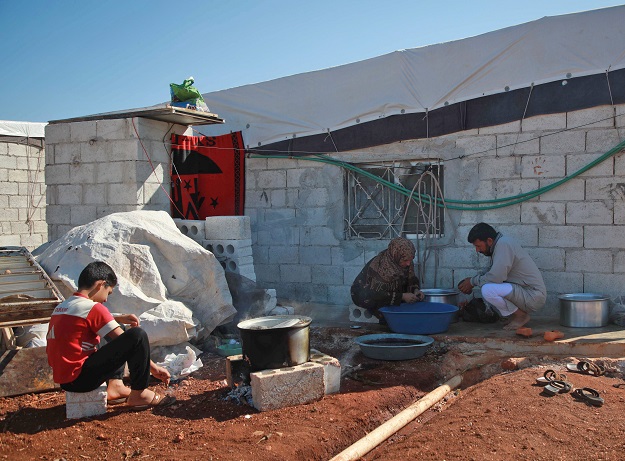 Abu Salloum and members of his family cook at a camp for displaced Syrians in Atme. (Photo: AFP)
Abu Salloum and members of his family cook at a camp for displaced Syrians in Atme. (Photo: AFP)The yard of their house is visible to Turkish guards posted on nearby watchtowers.
Sitting cross-legged on a carpet, Abu Salloum smokes a cigarette and sips tea, surrounded by three of his sons.
His wife prepares a traditional aubergine dish called makdous, while one of his daughters stares across an open field at a Turkish watchtower.
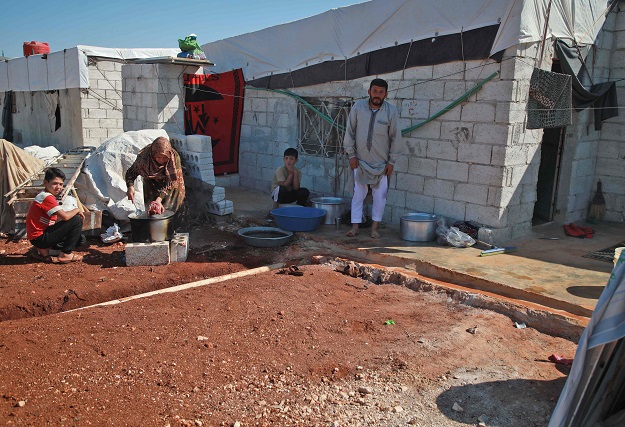 Abu Salloum and members of his family cook at a camp for displaced Syrians in Atme. (Photo: AFP)
Abu Salloum and members of his family cook at a camp for displaced Syrians in Atme. (Photo: AFP)The 45-year-old farmer said he dreams of escaping to Turkey, but with such a large family, crossing illegally would cost a fortune.
"Take us to Turkey, or find us a solution that would bring us back to our villages," he said.
"This life is unbearable."



















COMMENTS
Comments are moderated and generally will be posted if they are on-topic and not abusive.
For more information, please see our Comments FAQ